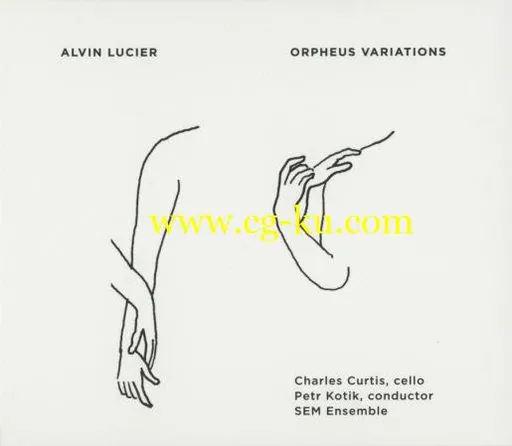EAC Rip | FLAC (tracks+log+.cue) – 144 Mb | Scans included | 00:31:29Modern Classical, Avant-Garde | Label: Important RecordsOrpheus Variations is a new composition by Alvin Lucier for solo cello and seven wind instruments.
It is based on a particular sonority from the first movement of Igor Stravinsky’s ballet score, Orpheus; a sonority that has haunted Lucier for decades.
Orpheus Variations is one of eight large-scale compositions made expressly for Charles Curtis by Alvin Lucier in the last 15 years.
This performance was conducted by Petr Kotik, with Charles Curtis playing solo cello alongside members of the SEM Ensemble.
“Lucier speaks first of a sonority, and only then of a chord. He discusses the chord, its notes and their disposition, but what haunts him is a “particular sonority.” A sonority is the product of physical action on physical materials: the instruments, the registers in which they are activated, the breath of the musicians, the waveforms thus produced, their merging and interfering, and finally the moment and place of these actions. An energy field, certain to vanish completely once the musicians put down their instruments. However concrete and real the actions and materials, the sonority they produce is a phantom.”Review By Kevin Press:It may be the least linear piece of music you’ve ever heard.
Influential American composer Alvin Lucier has transformed a seven-tone chord chosen from the first movement of Igor Stravinsky’s Orpheus into a 31-minute meditation.
Lucier uses the term “sonority,” which refers to complex harmonic structures.
The 87-year-old composer has written eight pieces for cellist Charles Curtis in the last 15 years, including this one.
Curtis appears here alongside the SEM Ensemble, conducted by Petr Kotik.
He draws the bow across his cello like a painter’s brush.
Each stroke adds detail, moving the piece closer to its eventual completion, even as it remains in place — it is both moving and unmoving.
Each moment deepens our understanding of why Stravinsky’s ballet has stayed with Lucier for decades.
It is an extraordinary thing to build a major work on something as ephemeral as a sonority.
Its equivalent in rock’n’roll would be to write an album based on guitar feedback at the end of a Sonic Youth bootleg or a jazz player writing a piece inspired by Thelonious Monk’s creaking piano bench.
In this sense, Orpheus Variations is a testament to how deeply serious musicians listen to music. Lucier has taken a single idea of Stravinsky’s — one that is remarkable in its own right, but that few casual listeners would take notice of — and turned it into something new and wonderful. It is both a tribute and a wholly original work. (Important)Tracklist:1. Orpheus Variations (after Stravinsky)
